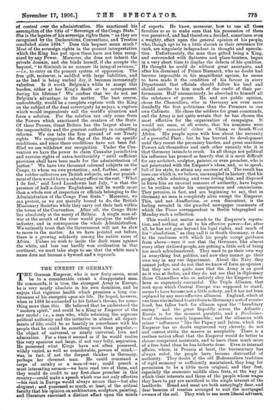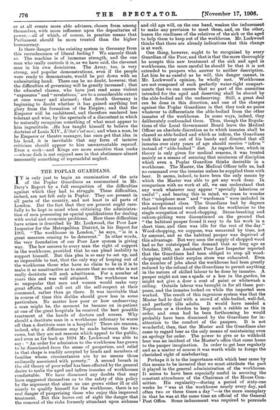THE UNREST IN GERMANY. T HE German Emperor, who is now
forty-seven, must be to a considerable extent a disappointed man, He commands, it is true, the strongest Army in Europe, he is very nearly absolute in his own dominion, and he enjoys that vigorous health which promises a long con- tinuance of his energetic open-air life. He hoped, however, when in 1888 he succeeded to his father's throne, for some- thing more than this. He believed that he understood the " modern spirit," and could be a King or Emperor of the new model ; i.e., a man who, while retaining the supreme political authority and the initiative in almost all depart- ments of life, could be so heartily in accordance with his people that he could be something more than popular,— the object of universal, or nearly universal, love and admiration. For a time it seemed as if he would realise this very spacious and large, if not very lofty, aspiration. He possessed what Kings have not often possessed, widely varied, as well as considerable, powers of mind,— was, in fact, if not the deepest thinker in Germany, perhaps her cleverest man. He could command a corps of cavalry or a man-of-war; could preach a most interesting sermon—we have read two of them, and they would do credit to any first-class preacher in this country—could make a speech which was not only effective —his rank in Europe would always secure that—but also eloquent ; and possessed. so much, at least, of the critical faculty that his opinion on architecture, sculpture, panting, and literature exercised a distinct effect upon the minds of experts. He knew, moreover, how to use all these faculties so as to make sure that his possession of them was perceived, and had therefore a decided, sometimes even a weighty, effect upon the general opinion of his people, who, though apt to be a little slavish in their reverence for rank, are singularly independent in thought and specula- tion. Unfortunately, the man thus gifted being a King, and surrounded with flatterers and place-hunters, began in a very short time to display the defects of his qualities. He thought he could do without great assistants, and after his dismissal of Prince Bismarck, who no doubt had become impossible in his magnificent egoism, he seems to have made it the condition of his favour in every Department that officials should follow his lead and should ascribe to him much of the credit of their per- formances. Half unconsciously, he absorbed to himself all the substance of power. He, and not public opinion, chose the Chancellors, who in Germany are even more decidedly the first politicians than the Premiers in our own Cabinets. He chose the soldiers for great commands, and the Army is not quite certain that he has chosen the most effective for the organisation of campaigns. It would not seem, at all events, that his nominees were singularly successful either in China or South-West Africa. His people agree with him about the necessity of a powerful Fleet ; but he has hurried its development until they resent the pecuniary burden, and great maritime Powers ask themselves and each other uneasily who it is that Germany intends to crush. In all things not political his influence has pressed so heavily that it is most difficult for any architect, sculptor, painter, or even preacher, who is not penetrated with the Emperor's ideas, and, so to speak, full of his style, to attain any success at all. The result has been one which is, we believe, unexampled in history: that his people, while admiring and even loving him, and disposed to leave him an unusual measure of authority, have begun to be restless under his omnipresence and omniscience. They perceive, in fact, and are beginning to say, that in Germany no man is completely alive except the Emperor. This, and not disaffection, or even discontent, is the feeling revealed in the guarded newspaper comments of which the Times correspondent in Berlin telegraphed on Monday such a collection.
This would not matter much to the Emperor's reputa- tion, and nothing at all to his effective power—far, after all, he has not gone beyond his legal rights, and much of his "absolutism," as they call it in South Germany, is due to the readiness with which his people accept guidance from above—were it not that the Germans, like almost every other civilised people, are getting a. little sick of being too much schoolmastered. They used to go their own way iu everything but politics, and now they cannot go their own way in any one department. About the Navy they cannot judge, and do not that we know of form an opinion ; but they are not quite sure that the Army is as good as it was at Sedan, and they do not see that in diplomacy those Chancellors who so entirely obey the Emperor have been so supremely successful. The Triple Alliance, that rock upon which Central Europe was supposed to stand, seems to have become not a little rickety, and it has not been replaced by any more effective alliances. England, which at one time was inclined to attribute to Germany a sort of cousin- hood, has fallen back for alliance upon the " hereditary enemy " and the great Republic across the Atlantic ; Russia is for the moment paralytic, and a Dreik.aiser- bund therefore nearly impossible ; and the alliances with minor " influences " like the Papacy and Islam, which the Emperor has no doubt engineered very cleverly, do not and cannot strike the masses as acceptable. There is a restless notion afloat that the Emperor would do better to choose competent assistants, and to leave them much more of a free hand than he has hitherto done. Even in internal affairs, where, in Prussia at least, the bureaucracy has always ruled, the people have become distrustful of authority. They doubt if the old Hohenzollern tradition of rigid economy is sufficiently maintained, they long for permission to be a little more original, and they fret, especially the economic middle class frets, at the way in which their interests and those of the people whose wages they have to pay are sacrificed to the single interest of the landlords. Bread and meat are both annoyingly dear, and dear because of treaties arranged to suit the mortgaged. owners of the soil. They wish to see more liberal advisers, or at all events more able advisers, chosen from among themselves, with more influence upon the depositaries of power,—all of which, of course, in practice means that Parliament should be more trusted than the higher bureaucracy.
Is there danger to the existing system in Germany from this recrudescence of liberal feeling ? We scarcely think so. The machine is of immense strength, and the one man who really controls it is, as we have said, the cleverest man in his own dominions. The Army, too, is very strong, and popular demonstrations, even if the people were ready to demonstrate, would be put down with an unhesitating hand. There can be no doubt, however, that the difficulties of governing will be greatly increased ; that the educated classes, who have just read some violent "exposures" and " revelations," are to a considerable extent at once weary and alarmed; that South Germany is beginning to doubt whether it has gained anything but glory from the formation of the Empire ; and that the Emperor will be embittered, and therefore rendered less tolerant and wise, by the spectacle of a discontent in which he naturally recognises something of what must appear to him ingratitude. .He has taught himself to believe the doctrine of Louis XIV., L'etat c' est moi; and when a man, be he Emperor or theatre manager, has once got that idea in his head, it is inevitable that any form of incisive criticism should appear to him unwarrantable reproof. Even a cook—and Kings are more sensitive than cooks —whose dish is not enjoyed sees in that abstinence almost necessarily something of reproachful neglect.



























































 Previous page
Previous page